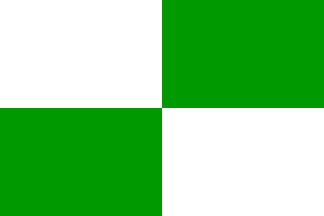![[Benavente variant#0]](../images/p/pt-bnv3.gif)
2:3 image by António Martins-Tuválkin and Jorge Candeias, 25 Aug 2010
![[Benavente flagoid#0]](../images/p/pt-bnv'3.gif)
2:3 image by António Martins-Tuválkin, and Jorge Candeias, 25 Aug 2010

FOTW beschäftigt sich mit der Wissenschaft der Vexillologie (Flaggenkunde).
Alle auf dieser Website dargebotenen Abbildungen dienen ausschließlich der Informationsvermittlung im Sinne der Flaggenkunde.
Wir distanziert uns ausdrücklich von allen hierauf dargestellten Symbolen verfassungsfeindlicher Organisationen.
Last modified: 2015-06-02 by klaus-michael schneider
Keywords: benavente | flag | cross(fleury) | cross(latin) | cross(aviz) | rope |
Links: FOTW homepage |
search |
disclaimer and copyright |
write us |
mirrors
![[Benavente municipality]](../images/p/pt-bnv.gif) 2:3 image by Sérgio Horta, 25 Aug 2010
2:3 image by Sérgio Horta, 25 Aug 2010
Now, this is a fairly typical portuguese municipal
flag, with the coat of arms centered on a
white and green quartered background. Flag and arms adopted
and published in the official journal
Diário do Governo : II
Série in 1972.06.30, an unusually late
date.
António MartinsTuválkin, 11 Sep 2007
.gif)
The shield of the coat of arms. It shows a flag, and it also shows
on a flag.
António MartinsTuválkin, 29 Sep 2007
The arms are Argent under a flag per pale turned sinister dancetty Argent
and Vert staffed Sable a latin cross fleury Vert void of the field and both
between two rope coils Purpure. Mural crown argent with four visible towers
(town rank) and white scroll reading in black
upper case letters "Benavente".
António MartinsTuválkin, 30 Sep 2007
The rope coils are officially red, former depictions showed them in purple, though.
The official text also says the flag is square, while depicting it about 3:5, probably quadrangular or rectangular is meant.
Meaning:
The name comes from Benavente, Leon (currently in Spain), much to the north and thus with no Mozarabic influence. This Benavente town in Portugal was founded by Leonese colonists brought in by the Calatrava Knights whom the King of Portugal had given the neighbouring Coruche Castle. The voided Avis cross might concern this.
As noted, thiese arms shows a flag as one of its main charges (said as accompanying the cross), one of the very few cases in Portuguese civic heraldry (except. paschal lambs, some vexilliferous knights and saints, and flagged ships and castles, only Baixa da Banheira (q.v.) compares), and also the canting arms of Bandeiras Commune. This flag is left unascribed in all descriptions of these arms I come across, and its design is known to me in three different incarnations:
António MartinsTuválkin, 25 Aug 2010
The current flag was approved relatively late, surely after an agreement was reached between the local government and the heraldic authority. This happens not rarely, but this time the previous arms, over which the disagreement was about, were used on a flag.
António MartinsTuválkin, 30 Sep 2007
![[Benavente flagoid red]](../images/p/pt-bnv'2.gif) 2:3 image by António Martins-Tuválkin, 25 Aug 2010
2:3 image by António Martins-Tuválkin, 25 Aug 2010
The 1860 civic armourial of Vilhena Barbosa [vbr60], on its p.73 (pl. inserted between pp. 72-73 and this page gives a "red flag", both in the text and in the lithographic plate (shown there quadrangular approx. 1:2, fringeless, hoisted on a spear), hatched vertically for red Pietra Santa, and no reason for it; these arms, dated of 1403 in the original stone, as described as town's and said to have been salvaged from a local ruined palace and integrated in an unspecified date in a wall of the local church of Our Lady of Grace. This early (earliest?) depiction also gave the rope coils as Vert ( "cordons, oir chains, also green ").
António MartinsTuválkin, 25 Aug 2010
![[Benavente flagoid dancetty#1 (legal)]](../images/p/pt-bnv'1.gif) 2:3 image by António Martins-Tuválkin, 25 Aug 2010
2:3 image by António Martins-Tuválkin, 25 Aug 2010
Later depictions show the rope coils red or purple (two commonly confused tinctures) and the flag in varied patterns of green and white. The current, legal pattern is approx. 3:5 white over green fesswise dancetty, with fringe on all three free edges.
António MartinsTuválkin, 25 Aug 2010
![[Benavente variant#0]](../images/p/pt-bnv3.gif) 2:3 image by António Martins-Tuválkin and Jorge Candeias, 25 Aug 2010 |
![[Benavente flagoid#0]](../images/p/pt-bnv'3.gif) 2:3 image by António Martins-Tuválkin, and Jorge Candeias, 25 Aug 2010 |
This is probably derived from an older depiction, shown on a samnitic shield, and its untypical scroll accompanyed by two crossed branches (left image), where the flag is green and white dancetty of four fesswise (right image), whith fringe on the fly only.
This depiction was probably in active local use until 1973 and maybe the unusual late approval date was due to insistence of the local officials on the untypical elements - the samnitic shield and the branches. This depiction can be found in several post-1973 sources, caused by administrative inertia: I was sent this depiction in 1996 from the local municipal goverment, for instance (Anuário do Ambiente 1996 Ecosfera: Lisboa, 1996), but not the following year, and the also 1996 Guia do Autarca 1996, also depicting emblems sent yearly by the local governments, does show the current pattern.
António MartinsTuválkin, 25 Aug 2010

Benavente municipality had 23 256 inhabitants in 2001 and consists of
4 communes covering 521,47 km². It is part of
Santarém District, traditional province
Ribatejo, 1999 ref. adm. region Estremadura e
Ribatejo, current C.C.R. / NUTS II Alentejo, pre-2002 C.C.R. / NUTS II Lisboa
e Vale do Tejo, and NUTS III Lezíria do Tejo.
António Martins, 30 Sep 2007
back to Municipalities of Portugal click here
Hosted by: Fanshop-Online.de und Handy-Shop.de
Tip: Handyvertrag